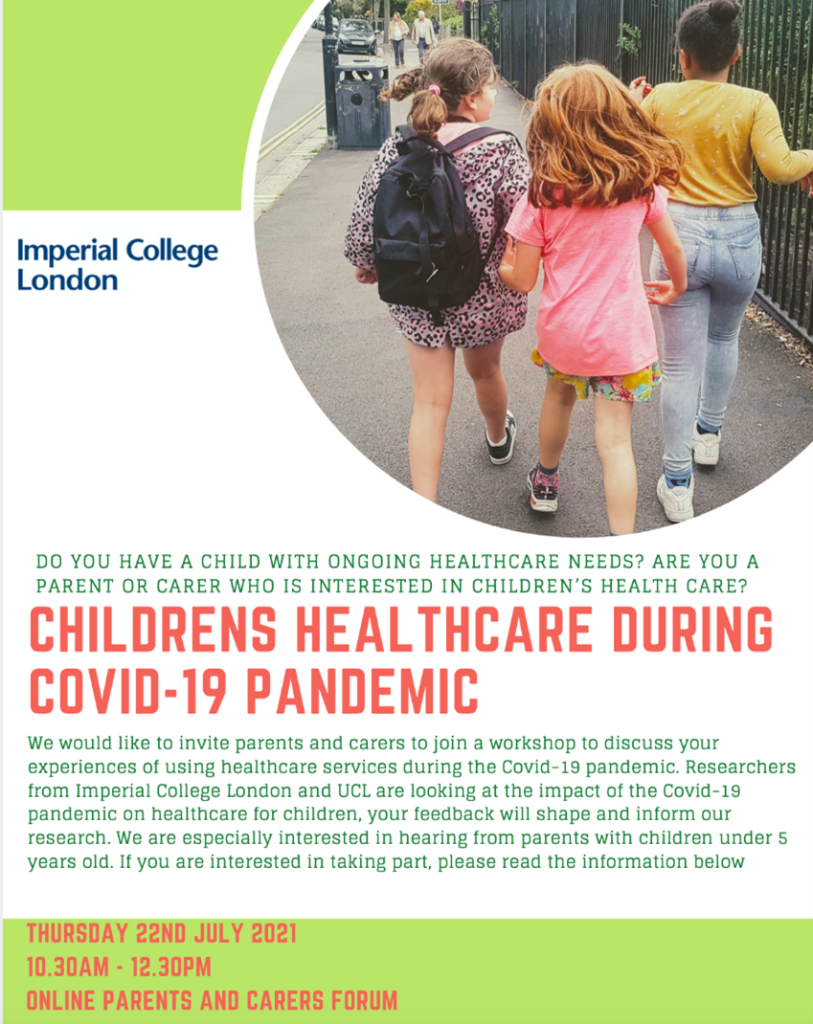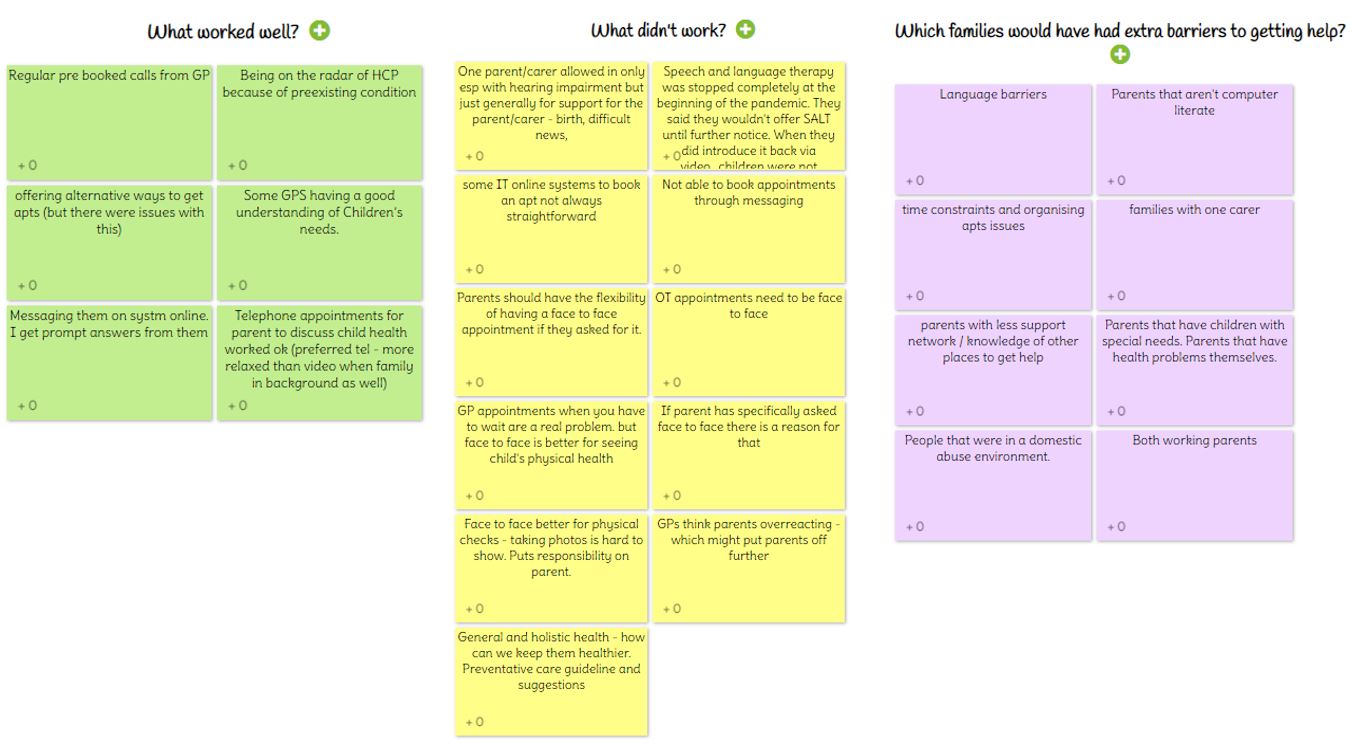- My Imperial Global Development Fellows Fund Placement at Imperial
- Researchers and community members working together to shape research on respiratory infections in young children
- HOPE for Hand Osteoarthritis
- Having an Impact with Public Involvement in Paediatric Intensive Care Research
- Public engagement and involvement at the Cardiomyopathy UK conference: When researchers and the public meet
In conversation with: Dr Kimberley Foley , a Postdoctoral Research Associate working within the Child Health Unit, Department of Primary Care and Public Health. Imperial College London
What did you do?
We invited parents and carers to a 2-hour online forum to share their experiences of accessing healthcare services for their children during the Covid-19 lockdown. Our research uses anonymised patient data collected from GP practices from the Clinical Practice Research Datalink in the UK. Our work is specifically looking at the number of times children and young people contacted their GP (in March to June 2020) compared to previous years.

What were you trying to achieve?
We wanted to learn about parent/carer’s experiences of accessing children’s healthcare during the Covid-19 pandemic. We were interested in finding out whether parents/carers tried to contact their GPs during the lockdown and if so, how easy, or difficult it was to get an appointment with a GP. This will help us interpret our results from the data we are analysing from the Clinical Practice Research Datalink. We also wanted to discuss and gather ideas about future research questions of interest to parents and carers of infants, pre-schoolers, and school-aged children.
Who did you involve and how did you find them?
We created a flyer to invite parents/carers to participate in our online forum which was distributed to various stakeholder networks including local special education needs and disability (SEND) parent support groups for North West London boroughs, online support groups such as parent-led Facebook groups and we also advertised on Twitter. Four parents participated in the online forum and one additional parent sent in reflections to our prompts/questions by email. We had hoped for more attendees which we discuss more below.
Were the people you involved given any training?
We did not provide any formal training for the online session. We emailed all participants a link to our Zoom session the day before the forum and we asked everyone to log on 5 minutes early so we could provide any technical support required to join with video/audio. During the session, our facilitator, Esta Orchard, an expert in engaging the public in research, provided an overview of the research study and purpose of the session. She engaged the parents/carers in conversation, used prompts as necessary to facilitate discussion, and structured the session with activities as well as leaving ample time for open discussion.
Did you achieve what you set out to do?
Yes, we heard about parents/carers’ experiences; the stresses of lockdown restrictions on families, and the need for healthcare services to provide reassurance and flexibility in how they could be accessed during times of crisis. Parents/carers spoke about what worked well, specifically mentioning the responsiveness of communication via online messaging systems and feeling supported by their GPs in terms of booking appointments proactively. Parents felt that their health care professionals took the time to listen carefully to their concerns and they did not feel rushed. However, parents also shared some of the challenges they faced in accessing healthcare during the lockdown, particularly in managing the shift from face-to-face to online/telephone appointments. Parents reported challenges with sending pictures to the GP in advance of telephone appointments. They felt pictures often didn’t accurately show the issue they wanted to discuss, and at times it was difficult to get the IT to work to send the photos requested. Parents also expressed concerns about potential health inequalities as it was difficult for some to access videos, websites and other resources shared by the GP due to a lack of IT literacy and/or access to stable Wi-Fi at home.
Esta, our facilitator, captured parents/carers’ thoughts and experiences using ideaBoardz, a free online team collaboration tool.

What impact did the public involvement have on the people?
Although we had hoped for up to 16 parents/carers to join the online forum, we found that having a small group was beneficial for the participants. Parents provided verbal feedback at the end of the session that a small group worked well as it provided an opportunity for everyone to be heard and they felt more comfortable sharing personal experiences. An ideaBoardz link was circulated after the session to collect any anonymous feedback, but none was provided.
“I think this group has been quite good, I think everyone understands each other. It is a small group and I think when it is a big group, I don’t know, I think this group is ideal for us, a small group works well for me”.
“I have enjoyed this – it’s nice to have some empathy from other parents”
The contributions from the parents had a positive impact on our research; their reflections helped us to revise some of the main messages and implications in the peer-reviewed publication we were writing. In particular, we revised the discussion section strengthening our arguments around areas to consider when redesigning healthcare services for future, particularly with respect to remote consultations. We also included the importance of retaining elements that have worked well during the pandemic. Definitive plans for our next publication are still under discussion, but the discussions and feedback from this forum are also helping to inform our ideas for future research in this area.
As a researcher, I felt that the public involvement work strengthened my motivation to study this topic – it highlighted to me how important this issue is to parents/carers of children.
What was the most challenging part of doing Public Involvement and/or Engagement and how did you overcome it?
The most challenging part was recruitment of parents/carers to the forum. This may have been partly due to timing – our forum was held just prior to the school holidays which is a very busy time for many parents/carers. We also started advertising for the forum 2 weeks in advance, but as some of our contacts were stakeholder networks that then circulated the information to relevant groups, this may not have been enough time to circulate the recruitment flyer to maximise participation. Even though we only had a small number of parents/carers participate, we received positive feedback from participants about the group size. We have continued to engage this group in follow-up calls and discussions to expand engagement.
What advice would you give other researchers interested in doing something like this?
Advanced planning for public involvement sessions is critical to ensure the time during the sessions is used effectively. Input can be valuable at various stages of the project, but the questions and goals of each public involvement session need to be adapted accordingly depending on the target group. I was fortunate to be working with a public involvement expert who was able to develop the recruitment materials, questions, and activities to facilitate group participation. She started the session by providing an overview of the research study and worked closely with me to ensure the language and content presented was scientifically accurate, but also accessible to a lay audience. She then led the group in a discussion by posing relevant questions about experiences in accessing health care during the pandemic, and she paid attention to group members’ participation to pace the activities accordingly, making sure quieter participants were given an opportunity to talk.
So, what’s next?
Our research is part of a larger NIHR funded study about children’s healthcare services during and after Covid-19. Amongst the wider research team, there have been other public involvement activities taking place with children and young people. As a group, we are in the process of reflecting upon our collective experiences of doing public involvement, the contributions public involvement has made to our work, and specifically, how public involvement has improved the quality of our research. For this piece of work in particular, for the parents/carers who provided consent, we acknowledged their contributions to our research in our manuscript, and we discussed the main messages with all parents/carers prior to submitting the publication. This paper is now under peer-review. We will draft a summary of the paper in lay language to share with our parent/carer group and others affected by this research.
Next, we plan to explore whether we have access to the data to address some of the research questions suggested by the parents/carers who participated in our forum, and we will stay connected to this parent/carer group to involve them again as the research progresses.
